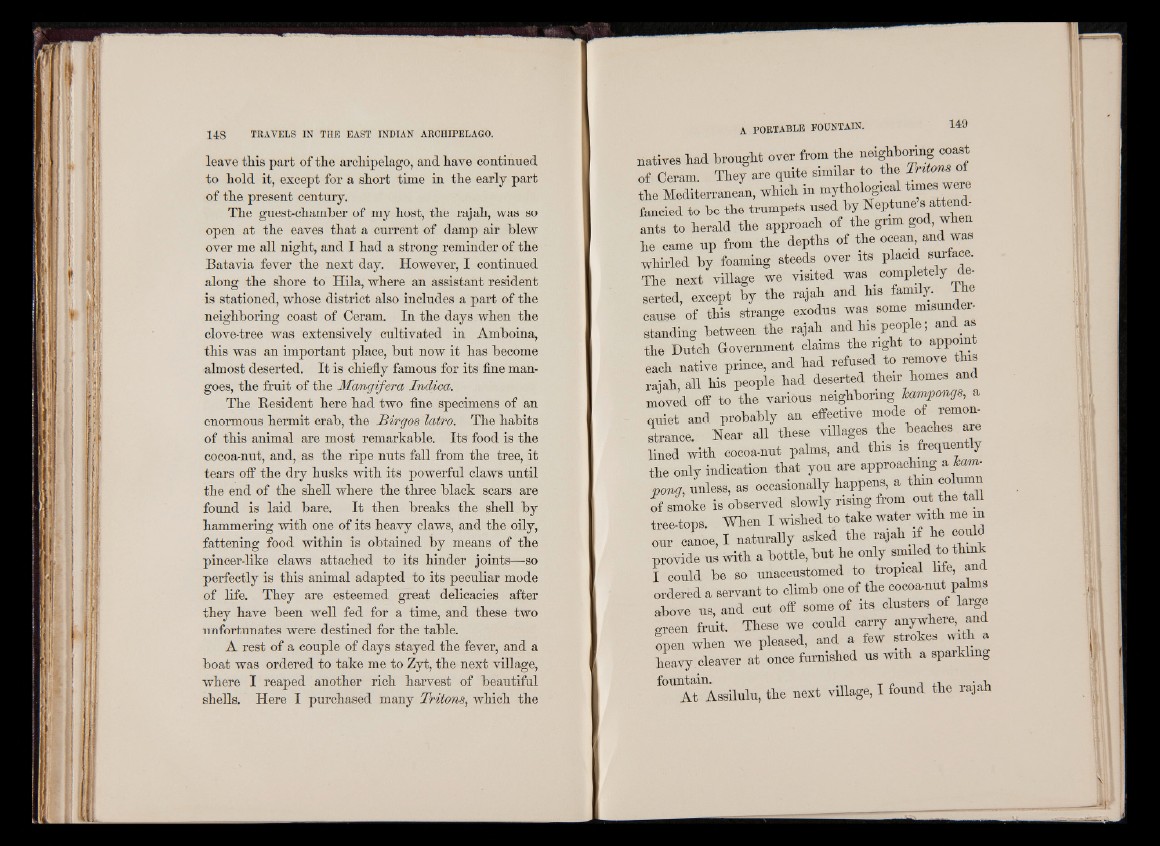
leave this part of the archipelago, and have continued
to hold it, except for a short time in the early part
of the present century.
The guest-chamber of my host, the rajah, was so
open at the eaves that a current of damp air blew
over me all night, and I had a strong reminder of the
Batavia fever the next day. However, I continued
along the shore to Hila, where an assistant resident
is stationed, whose district also includes a part of the
neighboring coast of Ceram. In the days when the
clove-tree was extensively cultivated in Amboina,
this was an important place, but now it has become
almost deserted. I t is chiefly famous for its fine mangoes,
the fruit of the Ma/rigifera Indica.
The Resident here had two fine specimens of an
enormous hermit crab, the Sirgos latro. The habits
of this animal are most remarkable. Its food is the
cocoa-nut, and, as the ripe nuts fall from the tree, it
tears off the dry husks with its powerful claws until
the end of the shell where the three black scars are
found is laid bare. It then breaks the shell by
hammering with one of its heavy claws, and the oily,
fattening food within is obtained by means of the
pincer-like claws attached to its hinder joints—so
perfectly is this animal adapted to its peculiar mode
of life. They are esteemed great delicacies after
they have been well fed for a time, and these two
unfortunates were destined for the table.
A rest of a couple of days stayed the fever, and a
boat was ordered to take me to Zyt, the next village,
where I reaped another rich harvest of beautiful
shells. Here I purchased many Tritons, which the
natives had brought over from the neighboring coast
of Ceram. They are quite similar to the Tritonsoi
the Mediterranean, which in mythological t™es
fancied to be the trumpets used by Neptune s attendants
to herald the approach of the grim god, when
he came up from the depths of the ocean and was
whirled by foaming steeds over its placid surface.
The next village we visited was comp e e y e-
serted, except by the rajah and his family. T
cause of this strange exodus was some misund -
standing between the rajah and his people; and as
the Dutch Government claims the right to appom
each native prince, and had refused to remove this
rajah, all his people had deserted their homes and
moved off to the various neighboring lam p o n g s, a
quiet and probably an effective mode of remonstrance.
Near all these villages the I beaches are
lined with cocoa-nut palms, and this is frequently
the only indication that you are approaching a Team-
p o n g , unless, as occasionally happens, a thin column
f f smoke is observed slowly rising from out the tall
tree-tops. m e n I wished to take water with me m
our canoe, I naturally asked the rajah if he could
provide us with a hottle, hut he only smiled to thin
I could be so unaccustomed to tropical life, an
ordered a servant to climb one of the cocoa-nut palms
above us, and cut off some of its clusters of large
green fruit. These we could carry anywhere and
open when we pleased, and a few strokes with a
heavy cleaver at once furnished us with a sparkling
f0UAt1 Assilulu, the next village, I found the rajah